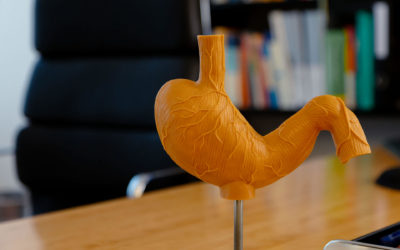Overview
Silent Reflux: an Underestimated Disease with Non-Specific Symptoms
What is Reflux?
Reflux refers to the backflow of stomach contents into the esophagus. This often involves stomach acid, enzymes, and bile acids, which irritate the esophageal mucosa that is insufficiently protected against these aggressive substances. As a result, individuals may experience common symptoms such as heartburn, acid regurgitation, and discomfort behind the sternum. Reflux typically occurs due to a dysfunction in the lower esophageal «sphincter», the valve at the entrance to the stomach, often in combination with a hiatal hernia.
What is Silent Reflux?
Silent reflux, also known as laryngopharyngeal reflux (LPR), is a specific form of reflux in which stomach acid not only ascends into the esophagus but also reaches the larynx and pharynx in the form of fine aerosol droplets. Unlike gastroesophageal reflux, silent reflux often does not present with the typical symptoms such as acid regurgitation. Instead, it leads to non-specific symptoms resulting from damage to the sensitive mucosal membranes of the upper airway and pharynx, including the larynx.
The enzyme pepsin, which is normally active in the stomach to aid in protein digestion, plays a crucial role in this condition. When pepsin comes into contact with the larynx and pharynx—especially after exposure to acidic foods or drinks—it can be activated and cause damage to the mucosal tissues.
Symptoms of Silent Reflux
The symptoms of silent reflux are often non-specific and can vary significantly. They may include:
- Recurrent hoarseness, particularly in the morning
- Chronic throat dryness or pain
- Persistent coughing and frequent throat clearing
- Sensation of a lump in the throat
- Sour or bitter taste in the mouth
- Chronic laryngitis (inflammation of the larynx)
- Excessive mucus production in the throat and nasal passages
- Sinus inflammation (sinusitis)
- Respiratory symptoms often misdiagnosed as asthma
Due to the absence of typical symptoms such as heartburn, silent reflux is frequently diagnosed late or misdiagnosed, leading to improper treatment. Patients often seek help from multiple specialists before receiving an accurate diagnosis. This delay can significantly impact quality of life, resulting in social withdrawal and depression.

Diagnosis of Silent Reflux
The diagnosis of silent reflux begins with a thorough medical history. This is typically followed by a gastroscopy to evaluate the condition of the mucosa, the function of the lower esophageal «sphincter», and the presence of any diaphragmatic hernia. However, in cases of silent reflux, these findings are often unremarkable.
Additionally, an acid measurement, such as pH metry or impedance testing, may be conducted to assess the acidity levels in the esophagus. If the symptoms remain unclear, it may also be helpful to measure the pH levels in the pharynx. Elevated pH levels in this area are more likely to indicate silent reflux.

Treatment Options for Silent Reflux
Treatment for silent reflux involves a multi-step approach, following the guidelines for managing classic reflux disease:
Lifestyle and Dietary Modifications
- Avoid acid-producing foods such as coffee, alcohol, spicy foods, fried foods, and acidic fruits or juices.
- Ensure adequate hydration by drinking at least 2.5 liters of fluid per day.
- Avoid eating late meals, with a minimum of three hours before bedtime.
- Implement daily adjustments, such as sleeping with the head of the bed slightly elevated (4-5 cm), favoring a left-sided sleeping position, using a humidifier in the bedroom, and refraining from smoking.
- Consider using lozenges or chewing gum to stimulate salivation and promote throat health.
Pharmacological Therapy
The goal of drug therapy is to protect the mucosa of the throat and pharynx from the harmful effects of stomach acid. Several classes of medications are commonly used:
- Alginates (e.g., Gaviscon) form a protective barrier on the food bolus, reducing the contact of acid with the mucosa.
- Antacids (e.g., Rennie) neutralize excess stomach acid.
- Proton Pump Inhibitors (PPIs) (e.g., esomeprazole) reduce stomach acid production. These medications are considered the gold standard for conservative treatment of reflux disease.
Surgical Therapy
If conservative treatments are insufficient, surgical intervention may be considered. This is particularly beneficial for patients with a concomitant hiatal hernia, as surgical reconstruction of the esophageal-stomach junction can help restore the closure mechanism, even in the presence of silent reflux. Our modified BICORN procedure, which has been in practice for many years, is a minimally invasive, gentle approach with a high success rate:
- Approximately 70% of patients with silent reflux experience symptom relief.
- Another 20% of patients show significant improvement.
Silent reflux is a distinct form of reflux in which stomach acid not only ascends into the esophagus but also reaches the larynx and pharynx in the form of an aerosol of fine droplets.
Mischa Feigel, MDRecommendation for Suspected Silent Reflux
Given that the exact mechanisms of laryngopharyngeal reflux are not fully understood, the condition poses significant diagnostic and therapeutic challenges. If silent reflux is suspected, it is recommended to seek evaluation by a reflux specialist. Collaboration among healthcare professionals from different specialties is often beneficial. A thorough diagnosis and personalized treatment plan are crucial for alleviating symptoms and improving long-term quality of life.




